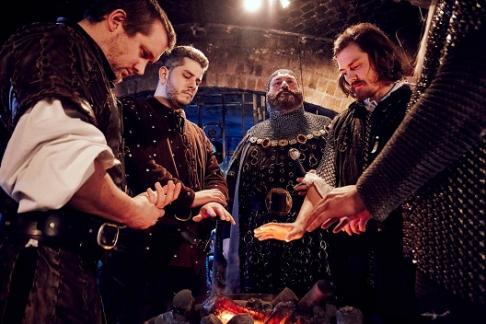
Medieval Banquet + FREE Tower Bridge Exhibition
Visión general
Medieval Banquet he Entertainment The music is drawn from the Medieval and Renaissance courts of Europe and covers the periods of the 12th, 13th, 14th, 15th and 16th centuries. Our musicians are at the forefront of a reemergence of Medieval English and European musical culture. The music is robust, engaging and emotive, bringing to life 800 year old musical manuscripts that have long been the domain of specialists and enthusiasts. Medieval Banquet Heritage All this takes place with the history of 1000 years beneath your feet! Our production pays homage to this history and notably to the Knights of Portsoken, a group of 13 knights in the retinue of 10th century English King, Edgar the Peaceful. The king gifted to them this very land upon which the banquet sits in recognition of performing three acts of bravery, one above ground, one below ground and one in the water, or so the legend goes. Each evening during the banquet our knights assemble to preserve the history of this ancient rite with an elaborate display of swordfighting There are many opportunities to dance with the cast, sing, bang your fists on the table and cry for your wench to bring you more food or drink! We also have a range of medieval costumes for hire to help you really look the part. BANQUET MENU A SOUP MADE DAILY WITH A SELECTION OF MARKET VEGETABLES A PLATTER OF SMOKED AND CURED MEATS SERVED WITH A GARDEN SALAD A CAULDRON OF ROASTED CHICKEN IN A TRADITIONAL MEDIEVAL SAUCE WITH ROASTED POTATOES AND HONEY GLAZED VEGETABLES SEASONAL FRUIT TART VEGETARIAN OPTION AVAILABLE UPON REQUEST AT TIME OF BOOKING A SOUP MADE DAILY WITH A SELECTION OF MARKET VEGETABLES MOZZARELLA AND TOMATO SALAD WITH BALSAMIC AND BASIL OIL ROASTED BUTTERNUT SQUASH FILLED WITH A ROOT VEGETABLE & BUTTERBEAN CASOULET TOPPED WITH CHEDDAR CHEESE SEASONAL FRUIT TART *** Please note menus are subject to change Tower Bridge Exhibition Walkways & Exhibition: Visitors enter Tower Bridge Exhibition via the North Tower. They are then transported by lift to the top of the Tower (47 metres above the Thames) where they have a unique opportunity to see the Bridge’s steel skeleton from within. A short film explains the history and provenance of the Bridge and then there is the chance to admire the spectacular views – from both covered Walkways. On Monday 1st December, Tower Bridge’s East Walkway will reopen with its own GLASS FLOOR, joining the West Walkway to complete our new-look exhibition. Together with far-reaching views of East London, the walkway will be bolstered with a further 20 revered bridges in the extended popular display, ‘Great Bridges of the World’. On the east Walkway there are fantastic views of the Docklands and from the west Walkway you can see the new GLA building, the Tower of London, St Paul’s, the city, the Pool of London and Big Ben and the London Eye in the distance. Interactive computerised kiosks and graphic panels explain the significance of the views to visitors, as well as providing more information on the history and building of the Bridge. The interactive material and graphic panels are written in seven languages and an audio loop for the hard of hearing is also in place for the video show. There is another film to view in the South Tower before descending for the short walk to the historical Engine Rooms, included in your ticket price. Victorian Engine Rooms: These provide a fascinating insight into late 19th century engineering. Installed for the completion of Tower Bridge in 1894, these huge, and beautifully maintained, coal-driven engines were used to power the thousands of bascule Bridge lifts performed until 1976. Although lifts are now operated by electricity, the original steam engines are still in place. The Engine Rooms give visitors a chance to experiment with models demonstrating the technology behind the Bridge. There are also some amazing photographs of Tower BridgeTthroughout its lifetime – including a revealing picture of the heavy steel structure of the Bridge as the stone cladding was installed over it.